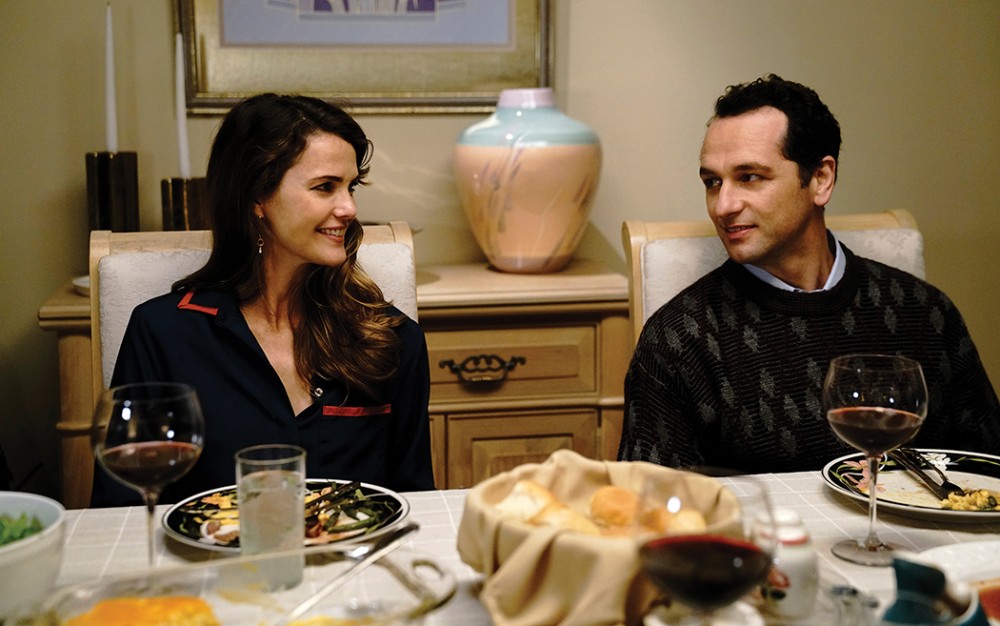What The Americans teaches about deception and relationships
By the end of the final season, the series has shown the best and worst of our homeland—and spies with souls.

In this golden age of TV antiheroes, it is not surprising that the FX drama The Americans can get us to root for Russian spies who are seeking to undermine the U.S. government. Complicating our emotional responses to characters is part of what serious TV does these days. Over the course of six seasons (the series ended in May), the show does something more surprising: it explores the consequences of deception and ideology on characters we can’t help rooting for.
Philip and Elizabeth Jennings (Matthew Rhys and Keri Russell) are undercover Russian agents living in a Washington, D.C., suburb during the Cold War of the early 1980s. In between kids’ hockey practice and homework schedules, they seduce possible informants, drug, torture, and kill enemies, decode secret messages, and maintain a dizzying number of disguises and safe houses. It is enough to make the most multitasking parent feel like a slacker.
Read our latest issue or browse back issues.
There is dark humor here, poking fun at the transactional nature of the hectic modern family. Near the end of the first season, Philip and Elizabeth are discussing a problem their son is having at school. Like most working parents, they divide up tasks and promise to pick up the conversation after they finish work. Then they walk into an abandoned warehouse to torture an FBI agent they are holding prisoner.
The humor quickly morphs into something more complicated. Philip and Elizabeth discover that after 15 years of pretending to be married, they are falling in love. The spark of their romance ignites a series of fires that threaten to destroy them. The threat comes from within because love, it turns out, does not mix well with deception and ideology.
The show is not against ideology whole cloth. There is something attractive about Philip and Elizabeth’s commitment to a way of life that resists the comforts of consumer capitalism. Through their eyes, we see what America looked like in the Reagan years to people who actively resisted American capitalist imperialism. They find an uneasy ally in a liberal pastor whose church is resisting U.S. military intervention in El Salvador. They meet with antiapartheid activists who share a vision for revolution it is hard not to support. And they are surrounded by Americans who are oblivious to the violence and hypocrisy that uphold their way of life. It’s not hard to feel a little of Elizabeth and Philip’s fury that their children are being indoctrinated into this easy consumerism.
But Elizabeth and Philip don’t just feel fury—they execute it quite literally. They kill, torture, and kidnap. They seduce and deceive. The spy games that thrill us in James Bond films are terrifying to see up close. And the cost is paid as much in their souls as in the body count they leave behind them. They have no access to the country or people whose way of life they are supposedly defending, so they rely more and more on Soviet ideology, without any living experience to inform their views. They can’t nurture any real relationships on the bedrock of deceit, and once they start wanting real relationships, the results are devastating.
In the second season, Philip begins attending EST (Erhard Seminar Trainings). A 1970s spiritual self-help movement, EST focused on personal transformation through radical honesty, self-knowledge, and accountability. You can imagine the challenge this poses to an undercover spy. But Philip keeps going back. He “does the work,” as they say, at least as much as he can without blowing his cover. He unearths childhood memories, mediates on the choices he’s made, and feels serious regret for the lives he’s harmed or taken. If we were using theological language, we might say that his soul begins to crack open.
Elizabeth mocks EST and its watered-down spirituality as just another opium of the masses. She has always been the hard-liner, going so far in the early years of their partnership as to report Philip for “liking America” too much, which ends with him being tortured by his own agency.
But Philip’s own soul excavation causes tremors in Elizabeth too. In one of the final episodes, she remembers an incident early in her training in Russia. So intent on following orders to the letter, she walked by a dying comrade in the streets and refused to help him. Her trainer gently reprimands her, saying she can’t lose her moral center, even in this line of work. The Elizabeth we know lost that moral center long ago, but her memory of this incident inspires one of her most morally free acts.
This is not a redemption story. Philip and Elizabeth can’t open their mouths without lying, often even to each other. But neither is it a story of crime and punishment. Everyone’s life is ruined even when it is saved (and maybe vice versa). The show is more a spy thriller with the soul of a Russian novel. Or to borrow from its own narrative devices, it’s a kind of EST seminar for viewers, asking us to learn through Philip and Elizabeth about choosing human relationships over ideology, honesty over deception, and moral freedom even when we are impossibly constrained. What could be more American than learning to do that work through a spiritual self-help movement? The work is costly and hard, but maybe it is what real Americans need most right now.
A version of this article appears in the print edition under the title “The soul of a spy.”







